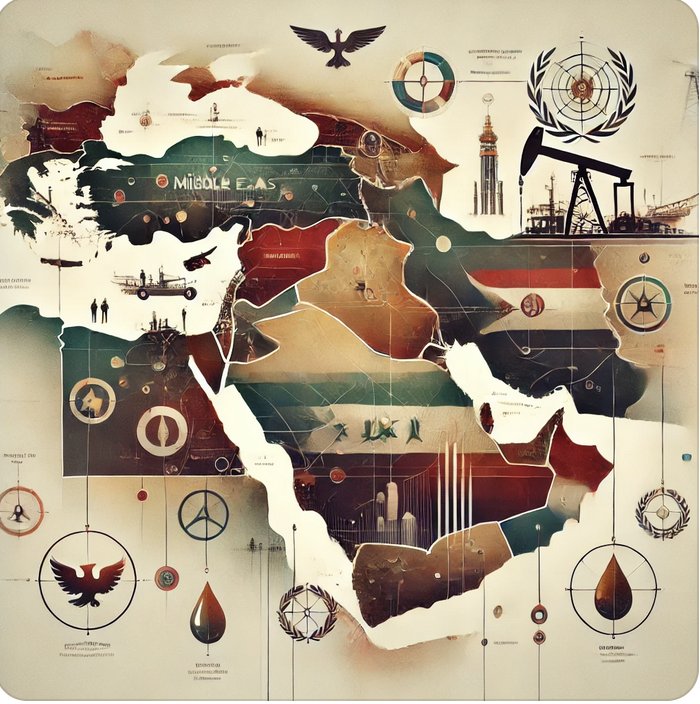

By Dr. Tim Orr
Conspiracy theories are not only pervasive in Western societies like the U.S., but they hold a special resonance in the Middle East, particularly within Arab, Iranian, and broader Muslim-majority cultures. The intensity and breadth of conspiracy thinking in this region stem from a unique combination of historical, psychological, and cultural factors that have shaped how many view political, social, and moral issues. Here, conspiracy narratives often become the lens through which people interpret their realities, particularly in times of crisis or instability. This phenomenon, particularly noteworthy in the Middle East, intertwines with deeply ingrained cultural norms and historical experiences of oppression, foreign intervention, and social dislocation.
One of the most glaring and troubling examples of this phenomenon is the widespread adoption of antisemitic conspiracy theories, particularly the narrative that blames Jews and Israel for a wide range of societal problems. Gunther Jikeli, a scholar of modern antisemitism, has highlighted how these conspiracy theories have been weaponized, especially in Muslim-majority societies, to redirect blame for internal struggles and failures onto external scapegoats like Jews or Zionist entities. Jikeli’s work underscores how this blame-shifting is not merely incidental but a key feature of how political and social failures are understood and explained in these contexts.
The Roots of Antisemitic Conspiracies: Historical and Political Traumas
In the Middle East, where historical traumas such as colonialism, imperialism, and authoritarian rule have left deep scars, conspiracy theories offer a coping mechanism. Antisemitic conspiracy theories, for instance, are not new but have morphed over time to fit contemporary political and social contexts. Jikeli provides examples of these narratives, such as the belief that Jews control global media, finance, and politics—described as an unseen hand manipulating world events to the detriment of Muslims. Another prevalent theory claims that Israel and Jewish organizations orchestrated the 9/11 attacks to justify Western military intervention in the Middle East, aiming to advance Zionist interests. These narratives do more than just foster hatred; they construct a worldview in which Muslims are perpetual victims of foreign plots, thus diverting attention from their own societies’ shortcomings (Jikeli, 2020).
These conspiracies are not merely the product of modern propaganda; they have their roots in centuries-old antisemitic tropes. The medieval blood libels, for example, which falsely accused Jews of poisoning wells or spreading disease, have been repurposed in modern Middle Eastern contexts, linking the State of Israel and the global Jewish community to a variety of moral, political, and environmental catastrophes. These accusations are not just fringe beliefs but are widely circulated in state-sponsored media, sermons, and educational systems, entrenching them into the cultural fabric of these societies. This dynamic illustrates how antisemitic conspiracy thinking serves a dual purpose: explaining societal problems while also solidifying a narrative of external persecution that can be weaponized for political gain.
Support Tim on Patreon!
The Psychological Appeal of Conspiracy Thinking: Paranoia and Vulnerability
As Zonis and Joseph explain in their seminal work, Conspiracy Thinking in the Middle East, conspiracy theories often arise from psychological needs. At its core, conspiracy thinking explains complex, uncontrollable events by attributing them to the secret machinations of malevolent actors. This thought pattern becomes even more pronounced in environments where people feel vulnerable, disempowered, or oppressed. The psychological concept of paranoia—a heightened sense of persecution—is closely tied to conspiracy thinking. While paranoia in its clinical form is a psychosis, Zonis and Joseph argue that conspiracy thinking shares many characteristics with it, including a pervasive sense that unseen forces are constantly working against an individual or group (Zonis & Joseph, 1994).
In societies experiencing intense social stress, political instability, or economic hardship—conditions all too common in the Middle East—conspiracy theories offer a way to make sense of uncertainty. This is especially true when historical experiences, such as foreign intervention or colonial rule, have left deep psychological and cultural scars. The projection of blame onto external actors serves as a defense mechanism, helping individuals and groups cope with feelings of helplessness and fear. The popularity of conspiracy theories in these societies can thus be seen as a psychological response to the long history of foreign domination and internal instability.
Cultural Dimensions: The Role of Secrecy and the Zahir-Batin Divide
Culturally, the Middle East has certain elements that uniquely reinforce conspiracy thinking, particularly in Arab and Iranian societies. One such cultural aspect is the deeply ingrained distinction between zahir (the visible, outer world) and batin (the hidden, inner truth). This dualistic view of reality is not just a spiritual or mystical concept in Islamic thought but a cultural norm that shapes how people perceive events around them. In a world where hidden truths are assumed to lie behind every visible action, conspiracy thinking finds fertile ground.
Zonis and Joseph point out that this cultural predisposition toward secrecy encourages people to seek hidden motives behind political, social, and economic events, reinforcing the idea that nothing is as it seems on the surface. In societies where authoritarian regimes often manipulate information, conceal their actions, and keep the public in the dark about key decisions, conspiracy theories thrive as a way for ordinary people to make sense of the world. The zahir-batin divide becomes a cognitive framework through which individuals interpret spiritual truths and political and social realities (Zonis & Joseph, 1994).
The Impact of Child-Rearing Practices: A Psychological Rift
Another important factor that Zonis and Joseph explore is the influence of child-rearing practices in shaping a conspiratorial worldview. In many Arab-Iranian-Muslim societies, child-rearing practices, particularly the abrupt separation of boys from their maternal world and their initiation into the harsh, authoritarian sphere of the father, mirror the zahir-batin divide. This abrupt transition can create a psychological rupture, leaving individuals with a sense of frustration and emotional dislocation that may later manifest in conspiracy thinking (Zonis & Joseph, 1994).
These early childhood experiences of separation, authoritarianism, and emotional upheaval can shape an individual’s worldview, making them more prone to seeing the world as divided between comforting, nurturing forces and harsh, hidden ones. Later in life, these unresolved psychological tensions can be projected onto broader political or social situations, making it easier for individuals to believe in evil, unseen forces—such as Jews or foreign powers—working behind the scenes to harm their community.
Historical Legacies: Colonialism, Foreign Intervention, and Humiliation
The psychological and cultural dimensions of conspiracy thinking are deeply intertwined with the historical experience of foreign domination in the Middle East. The legacy of colonialism, imperialism, and external intervention has left many in the region feeling deeply humiliated and disempowered. Zonis and Joseph argue that these historical traumas have created fertile ground for conspiracy theories, which offer a way to explain contemporary political and economic struggles as part of a larger foreign plot.
For example, the ongoing Israeli-Palestinian conflict, the U.S. invasion of Iraq, and the failures of the Arab Spring uprisings are often interpreted through the lens of external conspiracies. While elements of foreign interference are indeed present, conspiracy thinking takes these legitimate grievances and expands them into a worldview where malevolent external actors orchestrate all events. This historical legacy also feeds into a broader suspicion of modernization and Westernization, often viewed as veiled attempts at cultural domination (Zonis & Joseph, 1994). Conspiracy theories become a way for individuals and societies to resist these changes, portraying them as part of a foreign plot to undermine traditional values and Islamic identity.
The Role of Sexuality and Repression
From a Christian worldview, one can also examine the role of sexuality in fostering conspiracy thinking. Many societies, including those in the Middle East, maintain rigid moral codes surrounding gender and sexuality. These codes often lead to repression, distorting the biblical understanding of human sexuality as a gift from God. Without a redemptive understanding of God’s design for sexuality within marriage, repression can manifest as secretive attitudes and shame. This can lead to internal anxieties that are externalized in conspiracy thinking instead of being addressed through spiritual renewal.
In cultures where open discussion of sexuality is taboo, these anxieties can take the form of accusations that foreign powers or Jewish organizations are promoting sexual immorality to weaken the moral fabric of society. From a Christian perspective, such conspiracy theories deflect personal responsibility for sin and internal struggles, projecting them onto external enemies. In contrast, the gospel offers a way to confront the brokenness of sin, including sexual sin, through repentance and the transformative power of Christ.
The Feedback Loop: Self-Reinforcing Conspiracies
One of the most dangerous aspects of conspiracy thinking is its self-reinforcing nature. Once someone adopts a conspiratorial worldview, it becomes difficult to break free. Any evidence contradicting the conspiracy is dismissed as part of the plot, creating a cognitive loop where every event is seen as further proof of the conspiracy. This "self-sealing" logic makes conspiracy thinking resistant to disproof, as believers interpret skepticism as evidence that the conspiracy is working to cover its tracks.
In authoritarian regimes in the Middle East, leaders often manipulate conspiracy theories to maintain power. By blaming external enemies—whether the United States, Israel, or Western imperialism—for domestic problems, these regimes divert attention from internal governance issues and strengthen their hold on power (Zonis & Joseph, 1994). This tactic unites the populace against a common enemy and reinforces the feedback loop of conspiracy thinking, making it increasingly difficult to introduce critical thinking or alternative explanations.
Conclusion: Breaking the Cycle of Conspiracy Thinking
Conspiracy thinking in the Middle East is a deeply rooted phenomenon shaped by psychological, cultural, and historical factors. While it offers a way for individuals and societies to cope with powerlessness and vulnerability, it ultimately undermines political stability, social cohesion, and the potential for internal reform. The challenge for the region is to break the cycle of conspiracy thinking by fostering education, transparency, and open dialogue.
For this to happen, political reforms promoting accountability and cultural shifts encouraging critical thinking are essential. Only by addressing the root causes of conspiracy thinking—psychological vulnerabilities, cultural predispositions, and historical grievances—can the region move beyond the crippling effects of these narratives. Promoting education and transparency will be key to helping individuals and societies critically engage with the world, allowing them to move toward a more hopeful and constructive future.
References
Jikeli, G. (2020, August 7). European Muslim antisemitism [Video]. YouTube. ISGAP International. https://www.youtube.com/watch?v=kg-rxCT9sN8
Jikeli, G. (2015). European Muslim antisemitism: Why young urban males say they don’t like Jews. Indiana University Press.
Zonis, M., & Joseph, C. M. (1994). Conspiracy thinking in the Middle East. Political Psychology, 15(3), 443-459. https://www.jstor.org/stable/3791566
Tim Orr is a scholar, Evangelical minister, conference speaker, and interfaith consultant with over 30 years of experience in cross-cultural ministry. He holds six degrees, including a master’s in Islamic studies from the Islamic College in London. Tim taught Religious Studies for 15 years at Indiana University Columbus and is now a Congregations and Polarization Project research associate at the Center for the Study of Religion and American Culture at Indiana University Indianapolis. He has spoken at universities, including Oxford University, the University of Tehran, and mosques throughout the U.K. His research focuses on American Evangelicalism, Islamic antisemitism, and Islamic feminism, and he has published widely, including articles in Islamic peer-reviewed journals and three books.
Check out Dr. Orr's article on his Middle East Analysis
 Dr. Tim Orr's BlogDr. Tim Orr
Dr. Tim Orr's BlogDr. Tim Orr
Check out Dr. Orr's analysis of Islamic Anmtisemitism
 Dr. Tim Orr's BlogDr. Tim Orr
Dr. Tim Orr's BlogDr. Tim Orr
Sign up for Dr. Tim Orr's Blog
Dr. Tim Orr isn't just your average academic—he's a passionate advocate for interreligious dialogue, a seasoned academic, and an ordained Evangelical minister with a unique vision.
No spam. Unsubscribe anytime.
